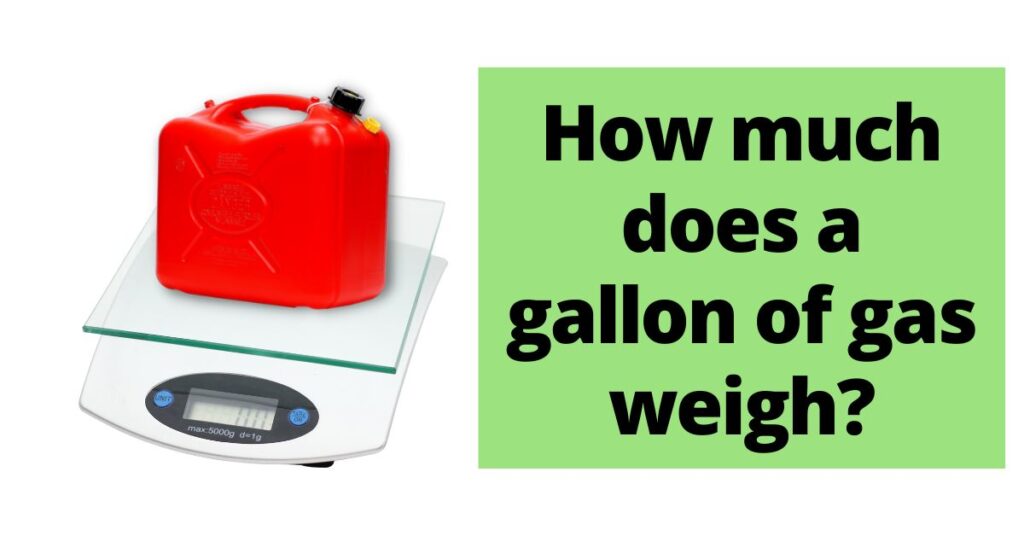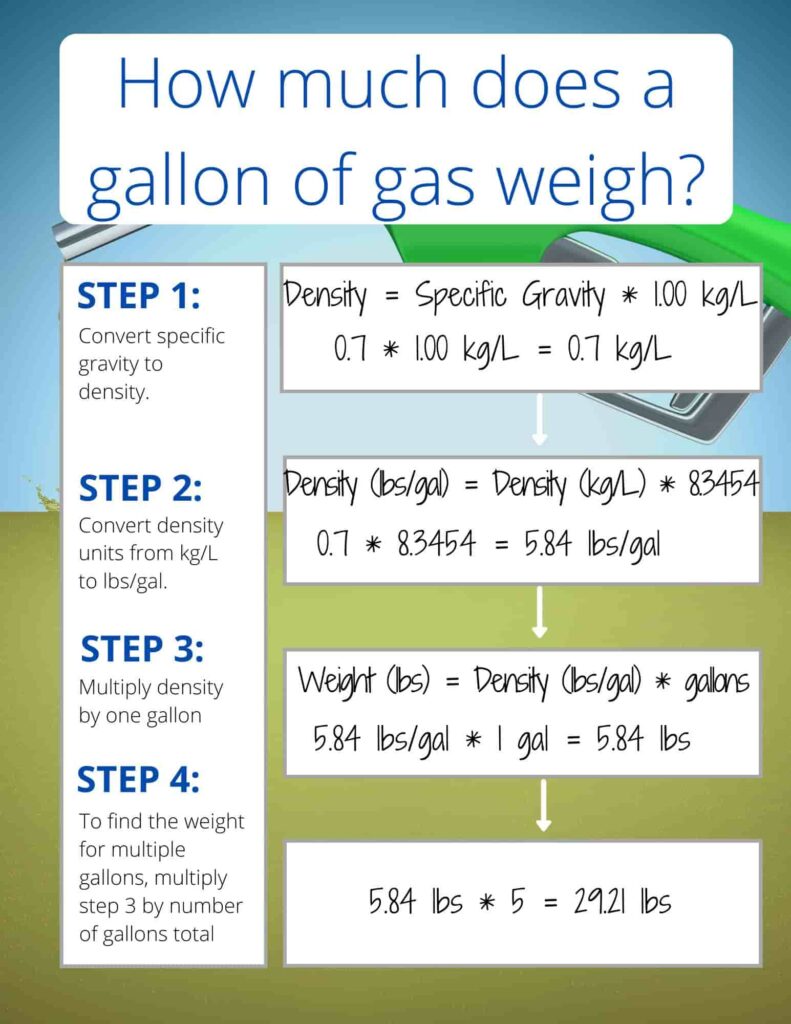According to the Safety Data Sheets of five major gasoline suppliers (Chevron, Citgo, ExxonMobile, Marathon, and Shell) all unleaded gasoline weighs around 6 lbs, but can vary as low as 5.76 lbs and as high as 6.68 lbs.
Safety data sheets are specifications released by the manufacturer that provides information about the specific product. The information listed on these documents are specs that must be met for every lot.
| Weight per 1 Gallon (lbs/gal) | Density (kg/L) | Specific Gravity | |
| Chevron/Texaco | 5.84 – 6.68 | 0.7-0.8 | 0.70-0.80 |
| Citgo | 6.01 – 6.43 | 0.72-0.77 | 0.72-0.77 |
| ExxonMobil | 6.01 – 6.33 | 0.72 – 0.76 | 0.72 – 0.76 |
| Marathon | 5.76 – 6.34 | 0.69-0.76 | 0.69-0.76 |
| Shell | 6.01 – 6.34 | 0.72-0.76 | 0.72-0.76 |
Resources:
- Chevron/Texaco Unleaded Gasoline SDS
- Citgo Unleaded Gasoline SDS
- ExxonMobil Unleaded Gasoline SDS
- Marathon Unleaded Gasoline SDS
- Shell Unleaded Gasoline SDS

Gasoline Weight Calculator
Use the calculator below to determine the high and low range of the weight of gasoline for any volume.
Simply input the number of gallons you want to measure and the calculator will give you the estimated weight of the gasoline based on the numbers above.
Why does it matter?
For the average vehicle, weight doesn’t matter much to the operation of a car or truck. In other applications, such as boating, or car racing, the desire for lighter gas may be more important.
You may think that lighter gas will yield better gas mileage because the weight is lower, but the minor difference in weight will have very little impact compared to the entire vehicle.
Other factors have more of an impact on efficiency, such as additives and quality.
However, when larger volumes come into play, such as carrying large loads of gasoline, a difference of 40 lbs may be important. When transporting gasoline in large loads, you have to make sure that your truck can support the weight of the cargo. This includes the weight of the passengers, other cargo, and anything else inside the truck.
This is what is referred to as the payload capacity (the amount a truck can carry). In most instances, the payload capacity reported for a truck includes a full tank of gas, so there will only be a couple of pound difference between the actual weight and the recorded weight by the manufacturer. These few pounds shouldn’t have a long-lasting impact.
To learn more about payload capacity, read the following article: What Does GVWR Mean? GVWR Explained for Trucks and Trailers
Why are the weights different?
You may be wondering why the weights of these major manufacturers are different. And this can come down to multiple factors, but mostly this comes down to quality.
The quality composition of gasoline varies from manufacturer to manufacturer. And some suppliers will have a higher tolerance for their specifications. For example, as you can see above, Chevron/Texaco has a tolerance of just under one pound difference, so from lot to lot, one pound of gasoline may be 6.68 lbs and the other may be 5.84 lbs.
Is diesel heavier than gasoline?
Diesel is 16 – 27 % heavier than regular gasoline.
A gallon of diesel gas weighs between 6.68 and 7.34 lbs according to specs from three major diesel suppliers (Chevron, Citgo, Marathon).
These ranges include both No 1 and No 2. You can find the difference in weight between No 1 and No 2 in the following documents.
| Weight per 1 Gallon (lbs/gal) | Density (kg/L) | Specific Gravity | |
| Chevron/Texaco | 6.68 – 7.34 | 0.8-0.88 | 0.80-0.88 |
| Citgo | 6.68 – 7.01 | 0.80-0.84 | 0.80-0.84 |
| Marathon | 6.84 – 7.18 | 0.82-0.86 | 0.82-0.86 |
Can the weight of gasoline change?
The weight of gasoline can change, but under normal conditions, the changes will be so minor that it won’t make a difference.
The information taken from the SDS sheets was the specific gravity. The specific gravity compares the density of one solution to that of water. So a specific gravity of 0.7 means that the gasoline has a density 70% of that of water.
Density refers to the amount of mass/unit volume. Water is widely accepted to have a density of 1.00 kg/L at normal conditions. The density of water can fluctuate, but to give some context, the density of water at 120 degrees F is 0.989 and at 40 degrees F is 0.999 (USGS.GOV). These minor changes may have an impact on the density of the gasoline, but the difference is very minor.
- Chevron Diesel No 1 SDS
- Chevron Diesel No 2 SDS
- Citgo Diesel No 1 SDS
- Citgo Diesel No 2 SDS
- Marathon Diesel No 2 SDS
How was the weight of gas calculated?
As mentioned in the section above, this information was taken by using the specific gravity of the gasoline by the SDS.
Let’s use the example of a specific gravity of 0.7.
To convert the specific gravity to a density, we need to multiply the specific gravity by the density of reference. In this case, this is 1.00 kg/L for water.
This gives a density of 0.7 kg/L for gasoline.
Then we need to convert the kg/L to lbs/gallon. This conversion rate is 8.2454 (lbs/gal)/(kg/L).
This gives a density of 5.84 lbs/gallon of gasoline.
Then we multiply this value by the number of gallons to determine the total weight for that volume.
See the full example below.

Conclusion
A gallon of regular unleaded gasoline can range between 5.76 and 6.68 lbs per gallon. This depends on the supplier and the quality of the gasoline.
There are many factors that can affect this number, but on average, one gallon weighs about 6 lbs.
How much does 25 gallons gas weigh?
144 – 167 lbs
How much does 40 gallons of gas weigh?
230 – 267 lbs
How much does 5 gallons of gas weigh?
29-33 lbs
How much does 10 gallons of gas weigh?
58-67 lbs
Is Water heavier than gasoline?
Yes water is heavier than gasoline. As shown earlier the specific gravity compares the density of gasoline to that of water and all of the specific gravities listed are below 1 which means they are lighter than water. Gasoline is 20-30 % lighter than water.
HOW MUCH DOES A FULL TANK OF GAS WEIGH?
Most cars have a gas tank size of 13 – 16 gallons. This means that a full gas tank weighs between 75 and 107 lbs.


